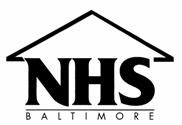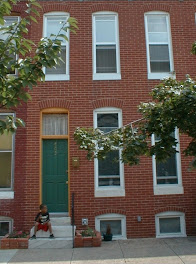By: Rena Somar, Homeownership Adviser, NHS of Baltimore
I am currently working with a client who called me on November 5th to help her with her mortgage. Her home was in foreclosure and scheduled to be sold on November 13th. I called her lender to work out some type of modification but they were not willing to work with her until she paid the legal fees. My client does not have an income because she is disabled and does not work. She is currently waiting on her disability check, which is backdated from 2006 due to a legal battle over pre-approval of her disability. Although she has since been approved, she will not receive her check for at least another month.
I called the Department of Housing and Community Development on November 6th and spoke with Jeanne Mullen, Manager of Single Family Collections, who asked me for certain documents, including written authorization from my client, giving me permission to work on her behalf. On November 7th I received a call from Gary Masseaux, Asset Management Officer of DHCD Delinquency Reports, who informed me that my client’s foreclosure sale date was stopped and they have given her 60 to 90 days to bring her mortgage current. This will give her enough time to receive her disability money and pay her mortgage in full.
Wednesday, November 26, 2008
Tuesday, November 25, 2008
Real Estate Market Still Safe in Some Places
By: Alicia Schuller, Marketing Coordinator, NHS of Baltimore
An article in Yahoo! today explained there are six places in the United States where the real estate markets continue to thrive and steadily grow. The lucky ones include:
1. Lancaster, PA.
2. Clarksville, TN.
3. Albuquerque, NM.
4. Burlington, VT.
5. Johnson City, TN.
6. Washington, D.C.
Read the full story for details on why these cities are weathering the storm…
An article in Yahoo! today explained there are six places in the United States where the real estate markets continue to thrive and steadily grow. The lucky ones include:
1. Lancaster, PA.
2. Clarksville, TN.
3. Albuquerque, NM.
4. Burlington, VT.
5. Johnson City, TN.
6. Washington, D.C.
Read the full story for details on why these cities are weathering the storm…
Tuesday, November 18, 2008
NHS of Baltimore Offering Free Income Tax Preparation
By: Alicia Schuller, Marketing Coordinator, NHS of Baltimore
Neighborhood Housing Services of Baltimore is pleased to announce we are offering free income tax preparation, during the upcoming season, for taxpayers making less than $42,000 a year. Services will begin in January and will be offered Tuesdays and Thursdays from 4:30pm-8:30pm, as well as Saturdays from 10:00am-5:00pm. Customers will have their taxes prepared by highly trained, well qualified volunteers. Spanish speaking accommodations are available Thursdays and Saturdays by appointment. This program will be made possible by NHS of Baltimore, the Baltimore Cash Campaign and the Volunteer Income Tax Assistance program (VITA). Call NHS of Baltimore and schedule an appointment today- 410-327-1200 Ext. 160. Or visit our website. VITA-- Volunteer Income Tax Assistance
Neighborhood Housing Services of Baltimore is pleased to announce we are offering free income tax preparation, during the upcoming season, for taxpayers making less than $42,000 a year. Services will begin in January and will be offered Tuesdays and Thursdays from 4:30pm-8:30pm, as well as Saturdays from 10:00am-5:00pm. Customers will have their taxes prepared by highly trained, well qualified volunteers. Spanish speaking accommodations are available Thursdays and Saturdays by appointment. This program will be made possible by NHS of Baltimore, the Baltimore Cash Campaign and the Volunteer Income Tax Assistance program (VITA). Call NHS of Baltimore and schedule an appointment today- 410-327-1200 Ext. 160. Or visit our website. VITA-- Volunteer Income Tax Assistance
Tuesday, November 4, 2008
$7,500 Homebuyer Tax Credit Needs Reworking
By: Alicia Schuller, Marketing Coordinator, NHS of Baltimore
It’s no secret. The economic downturn facing the United States right now was triggered by carelessness in the mortgage lending markets. Congress recognized the need for immediate action earlier this summer when they passed the Housing and Economic Recovery, which among many things, offered a $7,500 dollar tax credit to first time homebuyers as a way to stimulate home sales. The question now is-- is it working?
According to an article released last week by the Washington Post, very few first time homeowners have taken advantage of Congress’ tax credit. The largest reason-- the credit essentially amounts to a zero interest, federal loan. Given the current state of the economic crisis, potential homebuyers are extremely weary of loading on more debt.
This is not a good sign for an economy that is in desperate need of pumping up the housing market before it will see an end to the financial mess. Congress is now considering a second rescue bill to shore up the rescue package passed in early October. In addition to more federal oversight and assistance for businesses, the bill would include even more money for homebuyers, upwards of $12,000. However, it is still unclear whether a repayment provision will be included. Many argue this summer's housing bill provided enough money, but needs to be reworked to exclude the repayment requirement.
Cheryl Cassell, our own Assistant Director of Single Family Programs believes the best remedy for the housing market is a tax incentive that does not include a payback provision. “Housing tax credits can be a “hit or miss” in stimulating the housing market. The most recent tax credit proved not to be attractive because of the [the repayment component]. Historically, first time homebuyers generally do not have sufficient savings for a significant down payment. As such, instead of a tax credit with a repayment stipulation; a down payment credit or down payment assistance program would be more effective in stimulating the housing market.”
It’s no secret. The economic downturn facing the United States right now was triggered by carelessness in the mortgage lending markets. Congress recognized the need for immediate action earlier this summer when they passed the Housing and Economic Recovery, which among many things, offered a $7,500 dollar tax credit to first time homebuyers as a way to stimulate home sales. The question now is-- is it working?
According to an article released last week by the Washington Post, very few first time homeowners have taken advantage of Congress’ tax credit. The largest reason-- the credit essentially amounts to a zero interest, federal loan. Given the current state of the economic crisis, potential homebuyers are extremely weary of loading on more debt.
This is not a good sign for an economy that is in desperate need of pumping up the housing market before it will see an end to the financial mess. Congress is now considering a second rescue bill to shore up the rescue package passed in early October. In addition to more federal oversight and assistance for businesses, the bill would include even more money for homebuyers, upwards of $12,000. However, it is still unclear whether a repayment provision will be included. Many argue this summer's housing bill provided enough money, but needs to be reworked to exclude the repayment requirement.
Cheryl Cassell, our own Assistant Director of Single Family Programs believes the best remedy for the housing market is a tax incentive that does not include a payback provision. “Housing tax credits can be a “hit or miss” in stimulating the housing market. The most recent tax credit proved not to be attractive because of the [the repayment component]. Historically, first time homebuyers generally do not have sufficient savings for a significant down payment. As such, instead of a tax credit with a repayment stipulation; a down payment credit or down payment assistance program would be more effective in stimulating the housing market.”
Subscribe to:
Comments (Atom)




+for+blog.jpg)
.jpg)
